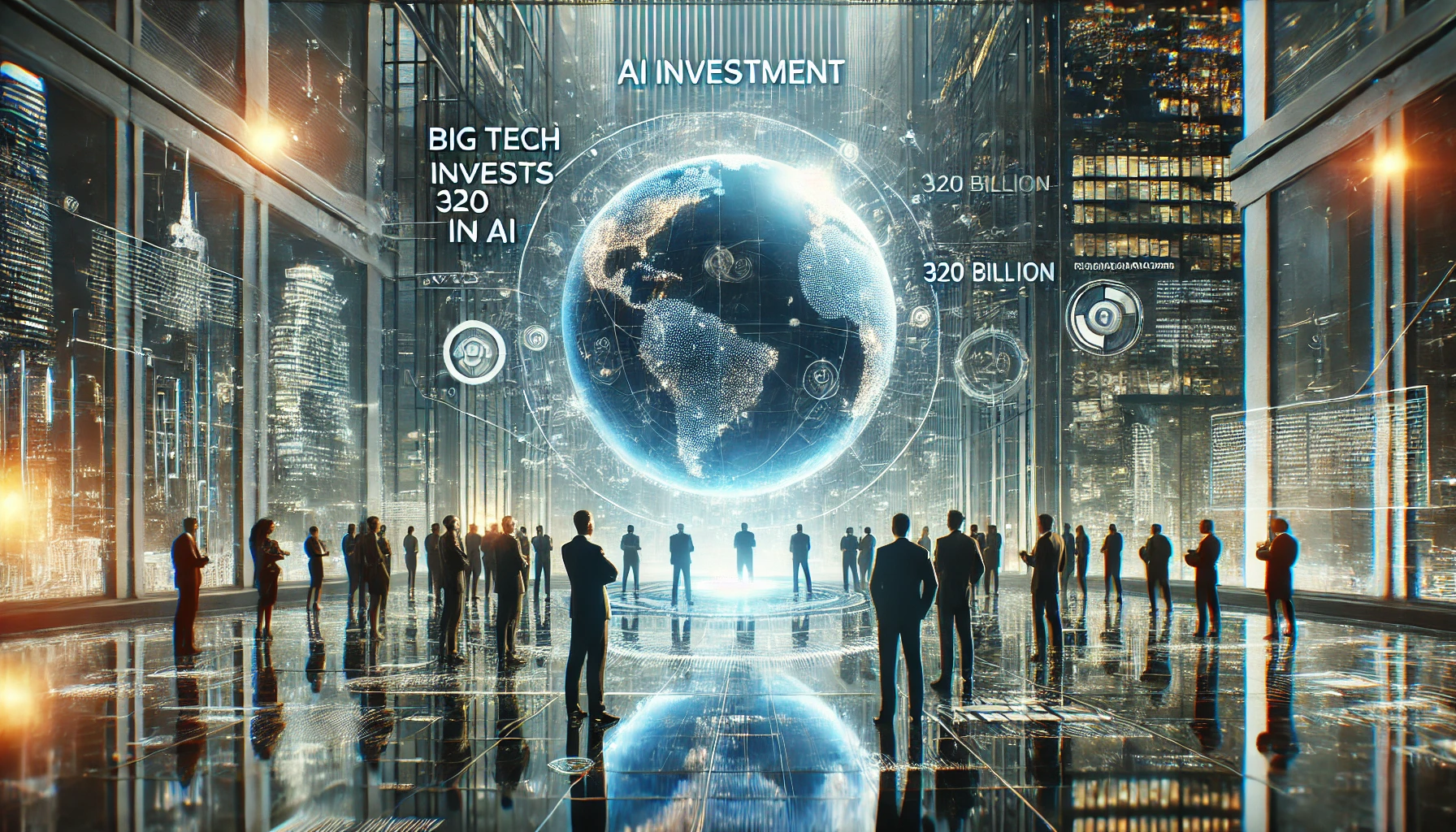
Big Tech’s $320 Billion AI Bet: How Microsoft, Alphabet, Meta, and Amazon Are Reprogramming the Future
AI Investment In 2025, the world’s largest and most influential technology companies are making bold moves that could redefine the entire digital landscape for decades to come. Microsoft, Alphabet (Google’s parent company), Meta Platforms, and Amazon have announced plans to invest over $320 billion this year alone in artificial intelligence (AI) infrastructure. This shift from historically lean, asset-light business models to heavy capital expenditures signals a deep commitment to the AI-driven future. While these aggressive investments highlight confidence in AI’s transformative potential, they also spark important questions about financial risks and investor sentiment in the near term. Here’s an in-depth look at why this new AI spending spree will shape the next chapter of technology.
For much of the last two decades, Big Tech companies prioritized scaling efficiently with minimal investments in physical infrastructure. Cloud computing, software services, and digital advertising drove profitability without the need for significant capital spending. However, the rapid rise of AI—particularly large language models, generative AI applications, and real-time data processing—has dramatically changed this equation.
AI System nowadays force computing levels that is not available before. Special Processor like GPU, smart storage, and global broad wireless internet it is not optional anymore-everything is important.
Faced with these demands, Big Tech leaders have been forced to shift their strategies. They are no longer relying solely on third-party providers or gradual growth. Instead, they are aggressively building AI infrastructure themselves, creating vast data centers, developing proprietary chips, and ensuring global connectivity. This movement mirrors the early race to build cloud computing capacity but on an even grander and more urgent scale.
Key Facts & Details:
Massive AI-Driven Capital Expenditures:
- Microsoft: Increasing its capital investments from $80 billion in 2021 to a projected $290 billion in 2025. These funds will expand Azure’s AI capabilities, with a particular focus on scaling AI services across industries. CEO Satya Nadella has confirmed that Microsoft’s AI-related revenues have already surpassed $13 billion annually, a 175% increase from the prior year, demonstrating growing demand for AI-powered solutions.
- Alphabet (Google): Reaffirmed its commitment to spending $75 billion in 2025 despite global trade pressures, including tariffs. The funds will support its AI and data center infrastructure, which are vital for running advanced models like Gemini and expanding Google Cloud services globally.
- Meta Platforms: Increased its capital expenditure forecast to between $64 billion and $72 billion in 2025. These investments will support AI innovations in recommendation engines, virtual and augmented reality, and content moderation, central to Meta’s broader vision for immersive and AI-enhanced social platforms.
- Amazon: Planning to spend more than $100 billion, primarily through AWS to meet surging enterprise demand for AI capabilities. AWS has already become a dominant player in AI services, and this investment will reinforce its position by upgrading data centers and integrating AI-first offerings.
📢 Industry Voices and Investor Reactions:
The scale of these investments reflects Big Tech’s confidence in AI’s future profitability. Yet, the aggressive spending has raised eyebrows on Wall Street. Analysts and investors are worried about declining returns on invested capital (ROIC), at least in the short term. Microsoft, for example, may see its ROIC drop from 80% to under 40% as it pushes forward with massive infrastructure upgrades. However, leaders like Nadella argue that short-term sacrifices are necessary to seize long-term dominance in AI, which is fast becoming central to every major software and service.
🏦 Why This Marks a Strategic Shift:
This new phase of capital intensity marks a departure from Big Tech’s previous operational models. Unlike software or digital advertising—which scaled rapidly with low fixed costs—AI requires substantial upfront investment. AI data centers need cutting-edge chips, advanced cooling systems, and round-the-clock operations. Moreover, as generative AI models become more powerful and integrated into products, the demand for continuous learning and retraining grows, adding to infrastructure requirements. Simply put, AI is no longer an add-on. It has become the bedrock of digital services and will shape how companies compete globally.
Analysis & Impact:
Transforming the Technology Industry:
The race to build AI infrastructure in 2025 will likely establish new industry leaders. Companies that can efficiently scale their AI offerings will dominate emerging fields like AI-as-a-service, autonomous robotics, smart manufacturing, and personalized digital ecosystems. This isn’t just about speed—reliability, capacity, and global accessibility will separate the leaders from the laggards. These investments also set the stage for AI to disrupt industries far beyond tech, including healthcare, education, finance, and logistics, by making advanced AI tools accessible and affordable.
Balancing Risk and Reward:
While Big Tech is betting heavily on AI, risks abound. Building and maintaining advanced AI infrastructure is costly and complex. Market demand for AI could cool if regulatory concerns, privacy issues, or technology limitations slow adoption. Additionally, rapid technological advancements may render current infrastructure obsolete faster than expected. Big Tech will need to balance aggressive expansion with flexibility and smart financial management to avoid overextending and disappointing shareholders.
Redefining Big Tech’s Value Proposition:
The shift to capital intensity underscores a major change in how tech companies define success. In the past, growth was tied closely to asset-light models that produced high margins. Now, success will increasingly depend on which companies can deploy AI most effectively and scale their services seamlessly across the globe. Building trusted, secure, and innovative AI ecosystems will matter just as much—if not more—than short-term profitability.
Resources & References:
- Business Insider – “Tech Giants Are Lining up Over $300 Billion in AI Spend” (2025)
- Reuters – “Alphabet reaffirms $75 billion spending plan in 2025 despite tariff pressures” (2025)
- Business Insider – “What Big Tech CEOs are saying about their massive AI spending plans” (2025)
- Reuters – “Big Tech’s AI splurge worries investors about returns” (2025)
Big Tech’s $320 billion AI investment spree marks a pivotal moment in the evolution of the digital economy. These companies are reshaping themselves to meet the challenges of the AI era, balancing immense capital outlays with the promise of market leadership and innovation. While some investors remain wary of reduced short-term returns, the long-term vision is clear: AI will be the foundation of next-generation technology services.
The question now is whether this bold gamble will redefine success or create new vulnerabilities. Do you believe Big Tech’s AI investments are visionary or risky? Share your opinions in the comments below and subscribe to AI Brief Now to stay informed on how artificial intelligence continues to reshape the world’s most powerful companies and industries.


